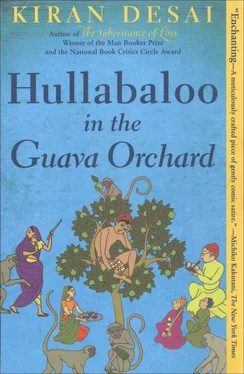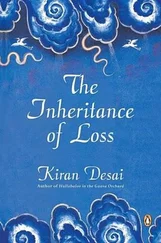Kiran Desai
Hullabaloo in the Guava Orchard
That summer the heat had enveloped the whole of Shahkot in a murky yellow haze. The clutter of rooftops and washing lines that usually stretched all the way to the foothills at the horizon grew blurred and merged with the dust-filled sky.
‘Problems have been located in the cumulus that have become overly heated,’ read Mr Chawla from the newspaper. ‘It is all a result of volcanic ash thrown up in the latest spurt of activity in Tierra del Fuego.’
And a little later he reported to whomever might be listening: ‘The problem lies in the currents off the West African coastline and the unexplained molecular movement observed in the polar ice-caps.’
And: ‘Iraq attempts to steal monsoon by deliberately creating low pressure over desert provinces and deflecting winds from India.’
And even: ‘Hungarian musician offers to draw rain clouds from Europe to India via the music of his flute.’
‘Why can’t they think of serious solutions?’ asked Mr Chawla. ‘It is too hot to fool about with Hungarian musicians.’
Shahkot boasted some of the highest temperatures in the country and here there were dozens of monsooninducing proposals. Mr Chawla himself submitted a proposal to the forestry department for the cutting and growing of vegetation in elaborate patterns; the army proposed the scattering and driving of clouds by jet planes flying in a special geometric formation; the police a frog wedding to be performed by temple priests. Vermaji of the university invented a giant fan which he hoped would attract the southern monsoon clouds by creating a wind tunnel moving north towards the Himalayas, and he petitioned the Electricity Supply Board for enough power to test it. Amateur scientists from Mr Barnala of Tailor Gully to Miss Raina from the Sainik Farms area attended trade fairs where they displayed instruments that emitted magnetic rays and loud buzzing sounds. Everyone in town was worried. The mercury in the police station thermometer had exceeded the gradations Kapoor & Sons Happy Weather Company had seen fit to establish, leaping beyond memory and imagination, and outdoing the predictions of even Mr Chawla’s mother, Ammaji, who liked to think she knew exactly what the future would bring.
It was a summer that sent the dizzy pulse of fever into the sky, in which even rules and laws that usually stood straight and purposeful grew limp, like plants exposed to the afternoon sun, and weak. The heat softened and spread the roads into sticky pools of pitch and melted the grease in the Brigadier’s moustache so that it drooped and uncurled, casting shadows on his fine, crisp presence. It burned the Malhotras’ daughter far too dark for a decent marriage and caused the water, if it came at all, to spurt, scalding, from the taps. The bees flew drunk on nectar that had turned alcoholic; the policemen slept all day in the banana grove; the local judge bribed an immigration official and left to join his brother in Copenhagen. Foreigners in their tour buses turned and went home, while Shahkotians argued for spots directly below their ceiling fans, leaving only for minutes if absolutely necessary and then hurrying back. In the marketplace, they raided the shops for palm leaf fans and bought grey blocks of ice that smoked like small fires. They rested their heads against the coolness of melons before cutting into them, held glasses against cheeks and foreheads between sips, fanned themselves at the stove with bunches of spinach before letting go reluctantly, for the sake of the evening meal.
The weeks passed, but the monsoon did not arrive. And by the time it was September, they had given up hope.
It was this year that Sampath Chawla was born to his mother, Kulfi. She was twenty-one years old, newly married to Mr Chawla, and pregnant. By late September the heat and lack of rain had combined to produce terrible conditions of drought. She grew bigger as it got worse. It got to be so bad that famine-relief camps were set up by the Red Cross to the west of Shahkot. The supply planes flew right over the bazaar and Shahkotians, watching with their heads tilted back, wondered why they didn’t stop for them as well, for surely they were suffering quite enough to warrant the same attention and care being so assiduously delivered elsewhere. The ration shop was distributing rice and lentils in smaller and smaller portions all the time. There was no fruit to be found anywhere and hardly any vegetables. Prices had risen so high, nobody would buy the scraggy chickens sitting in cages outside the meat shop. Finally the poor butcher had to eat them himself, and after the last one, he was forced to turn vegetarian like the rest of the town.
Kulfi, in these months, was so enormously large, she seemed to be claiming all the earth’s energy for herself, sapping it dry, leaving it withered, shrivelled and yellow. People stopped short in amazement as she walked down the street. How big she was! They forgot their dealings in the almost empty marketplace. They teetered on their bicycles as they looked around for just another sight of that stomach extending improbably before her like a huge growth upon a slender tree. Her eyes were so dark, so sooty and vehement, though, these people who turned their heads to stare turned quickly away again, ill at ease for some reason and unsettled. Not noticing them, she passed by as if they weren’t there at all. On her face, about her mouth and in the set of her chin was an expression intent and determined but yet far away and distant, as if all her thoughts were concentrated upon a point invisible to everybody but herself. She walked through Shahkot like this, as distracted as this, as strange as this.
‘What do you expect?’ asked Ammaji, her mother-in-law, making excuses when curious neighbours asked about Kulfi’s state of mind. ‘What do you expect from a woman with a baby in her belly like a little fish?’
But Kulfi was not thinking of the baby in her belly like a little fish. She was thinking of fish themselves. Of fish in many forms. Of fish big enough and good enough to feed the hunger that had overtaken her in the past months like a wave. She thought of fish curries and fish kebabs. Of pomfret, bekti, ruhi. Of shoals of whiskered shrimp. Of chewy mussels. She thought of food abundant in all its many incarnations. Of fenugreek and camel milk, yam and corn. Mangoes and coconuts and custard apples. Mushrooms sprouting like umbrellas in the monsoon season. Nuts, wrinkled in their shells, brown-skinned, milky-fleshed.
The house was small for her big desire. She walked from the tiny blue bedroom to the kitchen thick with the smell of kerosene, around the table and chairs, up and down the balcony, down the stairs past the rooms of neighbours who shook their heads over her, then around the jamun tree in the middle of the courtyard.
‘Oh dear, what is going to become of this woman?’ said Lakshmiji, the Raipurs, the Bengali teacher, and all of the others when they looked out of their windows, when they gossiped at the tea stall or sat in each other’s houses eating peanuts together. ‘There was always something odd about her,’ they said. ‘You could tell this from the minute she entered Shahkot.’
Meal after meal of just rice and lentils could not begin to satisfy the hunger that grew inside Kulfi; she bribed the vegetable sellers and the fruit sellers and the butcher with squares of silk, with embroidery, a satin petticoat, an earring set in gold, a silver nutcracker, bits of her dowry that had not yet been pawned. She bribed them until they had nothing left to give her anyway. By then, her hunger was so fierce, it was like a big, prowling animal. In her mind, aubergines grew large and purple and crisp, and then, in a pan, turned tender and melting. Ladyfingers were flavoured with tamarind and coriander. Chicken was stewed with cloves and cardamom. She thought of chopping and bubbling, of frying, slicing, stirring, grating.
Читать дальше












